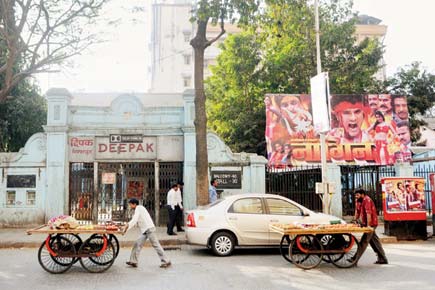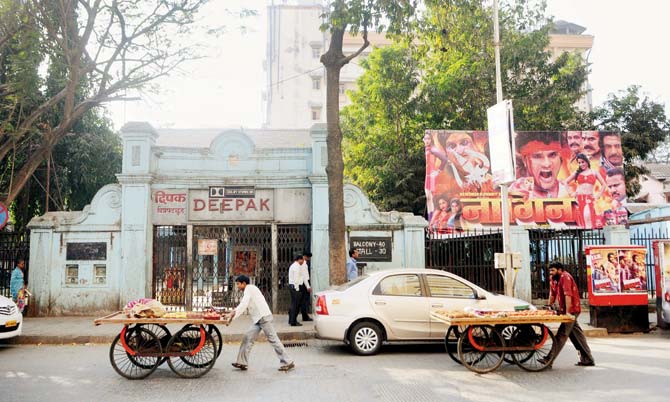Over the years, multiplexes have even taken over small towns, shutting off public places where classes merged for entertainment


One of Mumbai’s oldest single screen threatres, Deepak in Lower Parel is now home to the Matterden centre, screening Art House, world and indie films. File pic
 Growing up in Delhi, my special friends, across various phases, have been Chanakya, Priya, Amba, Paras, and Sangam. I’d visit them regularly to get entertained. Not that I ever went back to check on them once I left the city. But I know Chanakya - my neighbourhood BFF for the longest - is no more.
Growing up in Delhi, my special friends, across various phases, have been Chanakya, Priya, Amba, Paras, and Sangam. I’d visit them regularly to get entertained. Not that I ever went back to check on them once I left the city. But I know Chanakya - my neighbourhood BFF for the longest - is no more.
ADVERTISEMENT
It’s been over a decade since that glorious theatre, screening the finest Hindi and English films, was razed to the ground, replaced by rubble - the cordoned off precinct still waiting for a multiplex to come up in its place. Good old Panditji, the famous paanwallah, still sits in the corner of Chanakya, casually reminding us of what was very much part of the city’s contemporary heritage. Memory hasn’t failed him. He deals on a first-name basis with all his past regulars, and not merely famous ones like Shah Rukh Khan.
So yeah, Chanakya was my friendly neighbourhood theatre, like I’m sure, depending on your vintage, you’ve had one too. When it finally shut down in the mid-2000s, it felt like a part of me had died. There is something deeply personalised about theatres with human names. Every city has them - Chandan in Juhu (Bombay), Menoka in Gariahat (Calcutta), Urvashi in Lalbagh (Bangalore)…. The shared bond between the audience and the theatre is universal. And no, it’s not the same thing as a multiplex, which is essentially one of the many shops in any air-conditioned mall, offering any other product, like fish-massage, or Nike shoes next door, that most of the city can’t afford.
On our meagre school pocket-money, we couldn’t afford the multiplex either, when the first one, PVR, came up in place of Anupam in Saket (Delhi), in 1997. The state understood our dilemma, mandating that the first two rows of every multiplex audi be reserved for lukkhas like us, who could line up behind a special box office far at the back of the complex, braving police lathi-charge on occasion, to pick up tickets (only one per person) at R7 a stub. That scheme didn’t last long.
The state gave further sops to ensure multiplexes could become affordable still. None of those subsidies evidently got passed on to the consumer. By the mid-2000s, the dominant entertainment story in Maharashtra, for instance, was about single screen theatres going on strike, threatening to shut down permanently, reeling as they were under a back-breaking entertainment tax, while multiplexes enjoyed a tax holiday at the same time. Under the town-plan, since single screen cinemas are built on subsidised state land, they can’t be used for any other commercial purpose either.
A multiplex, with several cinemas in one building, was space/cost effective, meant to broaden our movie palette, throwing up the popular, early 2000 term - the ‘multiplex’ movie (for the ‘classes’), and the single-screen film (for the ‘masses’). The two gradually merged as ticket rates and insane samosa prices at multiplexes kept going higher still, regardless of a film’s budget, ensuring that only ‘massy pictures’ that could pack every seat got all the screens - even two ‘event pictures’ over the same weekend is now perceived as war.
We frequented over-priced multiplexes nonetheless. Perhaps, because our own incomes had risen. Or, that we had begun watching fewer films. The latter is most likely the case. Theatrical footfalls have fallen across the globe. Cinemas are forced to compete with the Internet, and the cellphone, prompting Hollywood, for instance, to dehumanise movies altogether, piling up prequels, sequels, epics and actioners, on 3D and Imax, to entice audiences for ‘big screen’ experience, rather than a film.
But that’s a separate issue. Newer multiplexes are still sprouting up everywhere.
While travelling across Middle India - Ranchi, Meerut, Ludhiana, Jamshedpur, Indore, Bhopal, Lucknow, etc, etc - for the nationwide Jagran Film Festival mid-last year, all I kept wondering was where have all the cinemas gone? There are streets, squares, and even neighbourhoods named after them. But those cinemas don’t exist.
Traditionally, in typical Tier-II and III towns, these theatres, usually with Hindu names, would be suffixed with ‘Talkies’ (‘taakeej’ in North India) -say, Prashant (in Saharsa, Bihar), or Jairam (in Salem, Tamil Nadu) -making them landmarks that were geographically as significant as the town’s railway station, and quite similar too.
Where else do all the social classes of a district merge for a common purpose/trip, even if they sit in separate enclosures - balcony, DC or the front-stall; like 2nd class or AC2, on a train.
That cinema experience that’s historically united a whole nation in its own way, I realised, had also gradually moved inside an AC mall, like a four-star hotel, that only the rich could afford, and the poor could gawk at from a distance - creating further divide, even in small towns, between the rickshawallah, and the semi-rich, both being Akshay/Salman’s fans.
So much for popular cinema being a common religion. I guess the only national unifier left is now the cricket match.
Mayank Shekhar attempts to make sense of mass culture. He tweets @mayankw14. Send your feedback to mailbag@mid-day.com
 Subscribe today by clicking the link and stay updated with the latest news!" Click here!
Subscribe today by clicking the link and stay updated with the latest news!" Click here!







